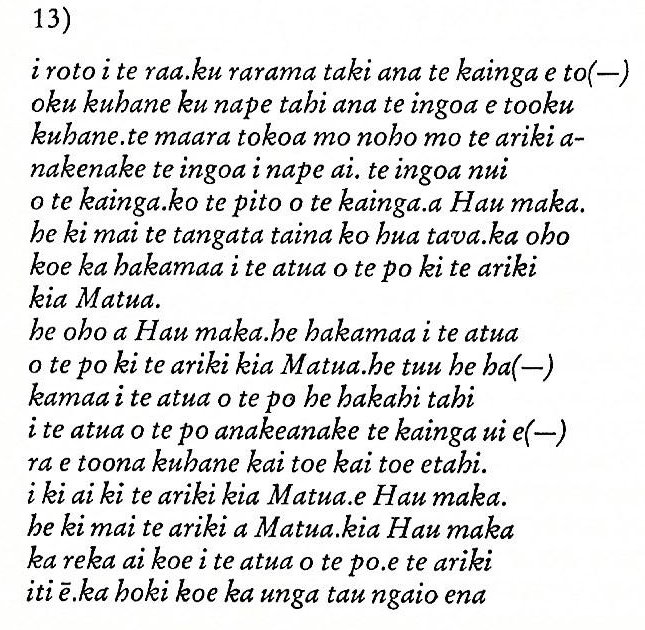
| nga.ki maori.
he ōo.ki roto ki te hakari he
ara |
She slipped into the (sleeping) body of Hau Maka,
and the body of Hau Maka awakened. |
|
E:12 |
| te
hakari.o hau maka. |
| Ara. 1. Road,
path; ladder. 2. To wake up, to concentrate on
something; he-ara te mata, to inspect
attentively; hé-ara, he-ûi a raro o te vai kava,
concentrating, he looked at the sea-bottom.
Ará-ará, to signal, to send signals with the
hand (to another person in the distance):
he-haaki-atu hai rima ará-ará. Vanaga. 1. Path,
trail, road, way. 2. a. To awake, to arouse; veve
ara, to awaken; hakaara, to arouse, to
excite. b. To be awake; hakaara, to be awake;
ara no, insomnia, sleeplessness. c. To watch,
to guard; tagata ara, sentinel. Churchill. |
| he ea ki runga he a he hakatopa i
te atua o |
He arose and said full of amazement
'Ah' and thought about the dream. |
|
Topa. 1. To
bend down, to drop to the ground; to fall on a
certain date. 2. To stop doing something, to drop;
ina ekó topa taau aga, do not stop, keep
doing your work. 3. To remain, to be left over, to
be unfinished; he topa te kai, the food is
not finished, there is some left. 4. To come to
one's memory; i te aamu he topa te vânaga tûai,
in the legends old words come to memory. 5. To
remember, to reflect (with mana'u as
subject); e-topa rivariva tokorua mana'u ki te
me'e nei, let the two of you think carefully
about this thing. Vanaga. 1. Wine; topa tahaga,
id. 2. To fall in drops, to descend, to go down, to
abdicate; topa iho, to fall; hakatopa,
to knock down, to cause to fall; hakatopa ki raro,
to knock down, to subjugate. 3. Childbirth,
abortion; topa te poki, to lie in. 4. A
feast, to feast. 5. To arrive, to result; topa
rae, newcome; topa iho, to come
unexpectedly; topa ke, to deviate; topa no
mai, topa hakanaa, topa tahaga,
mau topa pu, unexpected; topa okotahi,
solitary; hakatotopa, to excite, to foment.
6. Bad, low, cheap, failure; igoa topa,
nickname; ariga topa, sinister, sly,
ill-tempered, to hang the head; hakatopa, to
disparage; hakatotopa, irresolute. 7. (Of
upward movement) topa ki raro, to scale, to
surpass; hakatopa ki te ao, to confer a
dignity; hakatopa ki te kahu, to spread a
sail; hakatotopa, to make a genealogy.
Churchill. |
| te po he ngaroa te ahanga e
hua tava.he u(-) |
Hua Tava heard him saying 'Ah' and asked him
from the other end of the
house, 'What is it that amazes you so?'
Hau Maka replied,
'That which amazes me is a dream'.
Then Hua Tava said,
'How well you must have fared in this dream, oh
companion! Tell me
about your dream.'
Hau Maka told about
his dream: 'I was sleeping, and this is what
happened: My dream soul moved on, and, through the
power of her mana, my dream soul reached
seven [ehitu] lands, which were lying in the
midst of a dim twilight.
My dream soul looked around searchingly, but
these lands were not very good at all.
In the midst of dim twilight there is
Te Pei, the residence.
Not even eight [evaru] groups of people
(i.e., countless boat crews) can find the small
piece (of land?) again once it has been lost. |
| i mai mai
te rua tara pehe koe e a no ena |
| he ki atu a
hau maka.he mee au e a nei he |
| atua a te po oira a au e a nei he
ki hoko(-) |
| ou mai a
hua tava ka reka ai koe i tau atu(-) |
| a te po e
hokorua ē.ka hoa
mai tau atua |
| aau o te po.he hoa mai a
hau maka.i taana |
| atua o te po moe a au ka mee era
he oho too(-) |
| ku kuhane i ka mana atu tooku
kuhane ko |
| te kainga ehitu i roto i te
nehunehu kapua(-) |
| pua.hee rarama tooku kuhane
kainga tae |
| ripou ko roto ko te nehunehu
kapuapua.ko te |
| pei
te nohonga evaru kaukau eko ravaa |
| he vau kainga i runga e tau e
revareva ro a |
|
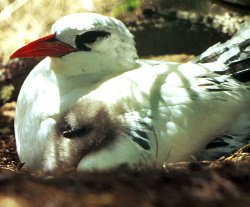 |
|
E:13 |
| i roto i te raa.ku marama
taki
ana te kainga e to(-) |
But one (can) take possession of [rava]
the eighth land: (It lies) 'on high', (it) juts out
(on the horizon), and its contours stand out against
the (rising) sun (i.e., in the east). |
|
Taki.
Dieffenbach, in his 'Travels in New Zealand',
mentions that a title or appellation of the chiefs
there was 'Taki o te
Wenua', and explains it to mean 'the root
of the land'. As the New Zealanders also came from
the Samoan group, it seems as if what once was a
national appellation, in course of time became the
title of a chief. If Diffenbach's interpretation of
the title is correct, it corresponds to the Hawiian
Kumu-honua,
the name of the first man. The same author also
mentions, p. 67, a place where chiefs go after
death, and says it is called
Taki-wana
... when a chief dies he first goes to
Taki-wana,
where his left eye remains and becomes a star. Then
he goes to Reinga
and further. Spirits sometimes leave the nether
world and come back on earth and communicate with
the living ...
Reinga was a place near the North Cape,
New Zealand, where the spirits of the dead collected
previous to their final departure. Fornander. |
| oku kuhane ku nape tahi ana te
ingoa e tooku |
My dream soul [tooku
kuhane] surveyed the land carefully and (also)
gave it a name. Likewise, the future residence of
the king and all other (places) were named.
The name (ingoa nui) for the whole land is
Te Pito O Te Kainga A Hau Maka.' |
| kuhane.te maara tokoa mo noho mo
te ariki a(-) |
| nakenake te ingoa i nape ai. te
ingoa nui |
| o te kainga.ko te pito o te
kainga.a Hau Maka. |
Here ends the description of his dream soul voyage as Hau Maka gave
it to
Hua Tava.
Then Hua Tava told him to go to the king and tell also him
about his dream:
| he ki mai te tangata taina ko hua
tava.ka oho |
The brother (taina)
Hua Tava spoke: 'Go and let King Hotu Matua know
about your dream!' |
| koe ka hakamaa i te atua o te po
ki te ariki |
| kia Matua. |
|
Oho. 1. To
go: ka-oho! go! go away! (i.e. 'goodbye' said
by the person staying behind); ka-oho-mai
(very often contracted to: koho-mai),
welcome! (lit.: come here); ku-oho-á te tagata,
the man has gone. Ohoga, travel,
direction of a journey; ohoga-mai, return. 2.
Also rauoho, hair. Vanaga. 1. To delegate;
rava oho, to root. 2. To go, to keep on going,
to walk, to depart, to retire; ka oho,
begone, good-bye; oho amua, to preced; oho
mai, to come, to bring; oho arurua, to
sail as consorts; hakaoho, to send, a
messenger. 3. Tehe oho te ikapotu, to abut,
adjoin; mei nei tehe i oho mai ai inei te ikapotu,
as far as, to; kai oho, to abstain, to
forego; hakaoho, to put on the brakes. 4. The
head (only in the composite rauoho, hair).
Churchill. |
| he oho a Hau maka.he hakamaa i te
atua |
Hau Maka went to tell
the king about the dream. When he arrived there, he
told his dream. He described the dream in detail,
including all lands his [toona] dream soul
had seen.
He omitted nothing whatsoever. |
| o te po ki te ariki kia Matua.he
tuu he ha(-) |
| kamaa i te atua o te po he hakahi
tahi |
| i te atua o te po anakeanake te
kainga ui e(-) |
| ra e toona kuhane kai toe kai
tohe etahi. |
| Ana. 1. Cave. 2.
If. 3. Verbal prefix: he-ra'e ana-unu au i te
raau, first I drank the medicine. Vanaga.
1. Cave, grotto, hole in the rock. 2. In order that,
if. 3. Particle (na 5); garo atu ana,
formerly; mee koe ana te ariki, the Lord be
with thee. PS Sa.: na, an intensive
postpositive particle. Anake, unique. T Pau.:
anake, unique, to be alone. Mgv.: anake,
alone, single, only, solely. Mq.: anake,
anaé, id. Ta.: anae, all, each, alone,
unique. Anakena, July. Ananake,
common, together, entire, entirely, at once, all,
general, unanimous, universal, without distinction,
whole, a company; piri mai te tagata ananake,
public; kite aro o te mautagata ananake,
public; mea ananake, impartial; koona
ananake, everywhere. Churchill. Splendor; a name
applied in the Society Islands to ten conspicious
stars which served as pillars of the sky. Ana
appears to be related to the Tuamotuan ngana-ia,
'the heavens'. Henry translates ana as
aster, star. The Tahitian conception of the sky
as resting on ten star pillars is unique and is
doubtless connected with their cosmos of ten
heavens. The Hawaiians placed a pillar (kukulu)
at the four corners of the earth after Egyptian
fashion; while the Maori and Moriori considered a
single great central pillar as sufficient to hold up
the heavens. It may be recalled that the Moriori
Sky-propper built up a single pillar by placing ten
posts one on top of the other. Makemson. |
| i ki ai ki te ariki kia Matua.e
Hau Maka |
After Hau Maka had
spoken to King Hotu Matua, King Hotu Matua answered
Hau Maka: 'You fared well in your dream, little king
(ariki iti)! Now go back and send me the
young men!' |
| ka reka ai koe i te atua o te
po.e te ariki |
| iti
ē.ka hoki koe ka unga tau ngaio ena |
...we find in the Rig-Veda that the Açvins are constantly being
celebrated, not only on account of their connexion with the
rising and setting sun, but also for notable acts of healing
performed upon blind people. Myriantheus, in his treatise 'Die
Açvins', points out this miracle as the leading one in the
record of the Dioscuri.
|
ARIES: |
|
1 |
Ashvini |
β and γ
Arietis |
Horse's
head |
April 17
(107) |
|
wife of
the Ashvins |
Sheratan
and Mesarthim |
|
2 |
Bharani |
35, 39,
and 41 Arietis |
Yoni,
the female organ of reproduction |
May 1
(121) |
|
the
bearer |
Musca
Borealis |

For him the Dioscuri stand for the
twilight, which is intermediate between the light and the
darkness, and which, if personified, can be said to set free the
Sun from the devouring Wolf of the night.
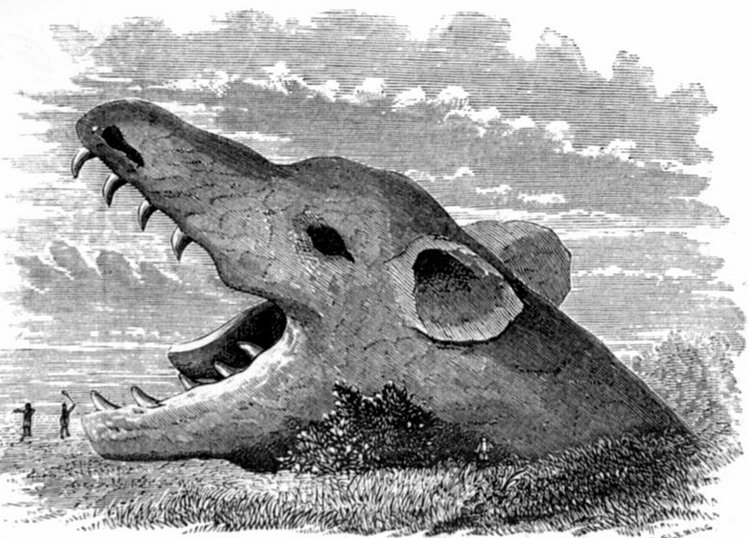
The argument is not
affected if we replace the twilight of Myriantheus by the
twin-light of the morning and evening star. 'By their
nature the Açvins are closely related both to the Light and the
Darkness; they are able to mediate between them and so to
liberate the gods of light from the demons of the dark'.
And Myriantheus thinks he has found the simple
explanation of the peculiar characteristics of the Dioscuri in
their intermediate position between Light and Dark, which
enables them to restore to the Sun the light which he lost at
his previous setting
...
... It must, however, be remembered that it follows from the
duality of the character of the Twins, in which benevolence is
the 'recto' and maleficence the 'verso', that they can as
readily produce blindness as remove it; it only depends on the
point from which we start, the Evening Star or the Morning Star. Of
these two, it may be regarded as natural that the Morning Star
should be considered to be the greater benefactor²,
and that the power of removing blindness will take precedence of
the power of causing it; and at the same time we must be
prepared to recognize both causes at work, and to see the
reflection of either form of activity in the legends that have
grown out of the primitive myth.
²) Accordingly, in the
Apocalypse, Jesus is described as the 'bright and morning star'
...
... Men swore by God and S. Polioctus because they had sworn by
Jupiter and the Twins, and they swore by Jupiter because, being
a sky-god, he was able to see everything that went on; and the
Twins, being assessors of the sky-god, shared his knowledge ...
So far we can see that Gemini is located just beyond the deep
point in the sky (or time) where Canopus,

or
the Old Man at the bottom of the sea was seated.
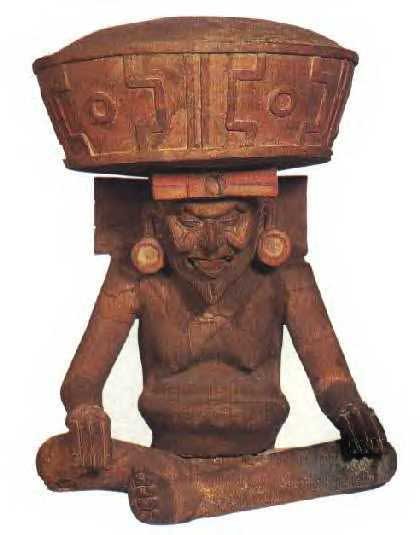
Their position is indeed, as
Rendell Harris has suggested, 'twilight' - the double lights. The border between Sky
(vertical) and Earth (horizontal) may have necessitated drawing a
constellation which was oriented neither as 90º
nor 0º, but as 45º

like the layout of the Spartan double
kingdom:
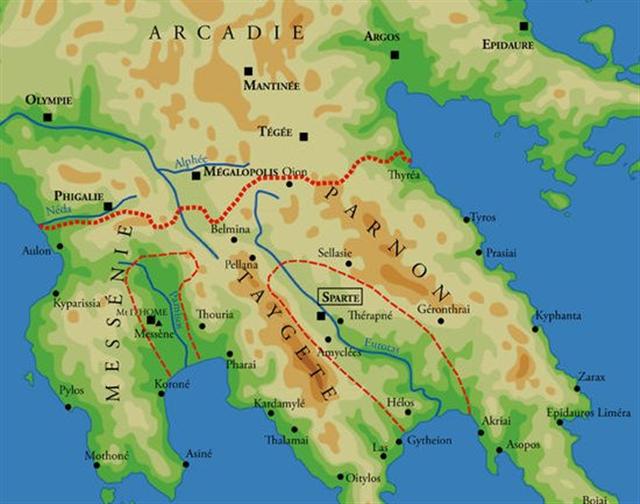
... At Verona is preserved the famous votive relief of Argenidas
and the Disocuri; where we have the cult represented in so many
different forms, the heroes standing, the urns of the dead
heroes entwined with serpents, and the sacred beams of
dokana which were their
Spartan symbol. But this relief was found at Este.
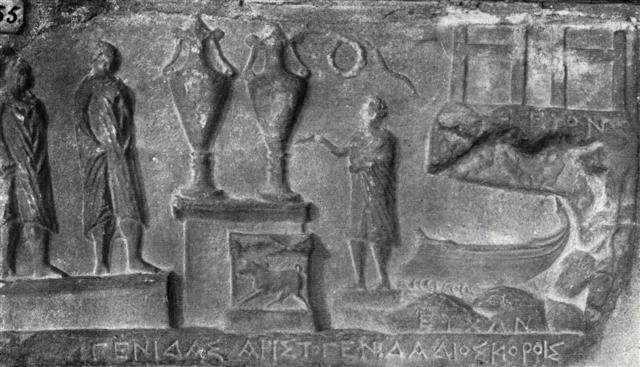
These dokana are
composed of a pair of upright beams, connected by a crossbeam in
the form of the letter H; and they correspond to the unfinished
brick wall of the Babylonian zodiacal sign, in the sense that
they show the Twins to have been builders. Miss Harrison points
out to me that the dokana
became actual objects of worship ...
... Now in Sparta it is well known that the sign of the Dioscuri
is the dokana, but it
is not yet as clear as one could wish it to be, in what way the
sacred cross-beams were arranged and what was the resulting
conventional figure of them.
In the votive tablet
of Argenidas, now at Verona in the Museo Civico, we have an
Anakeion or Temple of the Dioscuri (Anakes), whose front is
marked by the sign of the Dokana; the beams, if we may assume
the relief to contain the whole of the representation, are
simply arranged in the form of the letter H, and the figure is
repeated, so that we have side by side the delineation H H
...
Here I have to insert comments on
the word Anakes,
because I cannot avoid
thinking of Anakena, where on Easter Island the new Sun
king is born (according to Manuscript E). Anakeion is
very close in sound (and possibly also meaning) to Anakena.
Wikipedia:
Anax ...
is an ancient Greek word for '(tribal) king, lord, (military)
leader'. It is one of the two Greek titles traditionally
translated as 'king', the other being basileus. Anax is the more
archaic term of the two, inherited from the Mycenaean period,
and is notably used in Homeric Greek, e.g. of Agamemnon. The
feminine form is ánassa, 'queen' (from wánakt-ja)
...
... The meaning of basileus as 'king' in Classical Greece is due
to a shift in terminology during the Greek Dark Ages. In
Mycenaean times, a
gwasileus appears to be a lower-ranking official (in
one instance a chief of a professional guild), while in Homer,
Anax is already an archaic title, most suited to legendary
heroes and gods rather than for contemporary kings. The Greek
title has been compared to Sanskrit ...
vanij, a word for 'merchant', but in the Rigveda once
used as a title of Indra. The word could then be from PIE *wen-ag'-,
roughly 'bringer of spoils' (compare the etymology of lord,
'giver of bread').
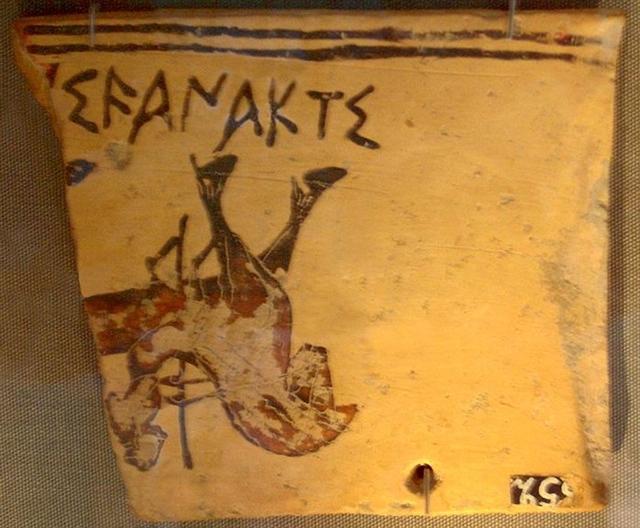
| manu pao i
te hau tea - kua tu |
manu rere
ki te hau tea - kua tu |
manu rere
ki te hau tea |
kiore -
henua |
 |
 |
 |
 |
|
Cb4-13 → 14 * 29½ |
Cb4-14 |
Cb4-15 |
CASTOR |
| erua
marama |
tagata noho i to mea |
kua vaha |
 |
 |
 |
 |
|
Cb4-17 (392
+ 88) |
Cb4-18 |
POLLUX |
Cb4-20 |
|














